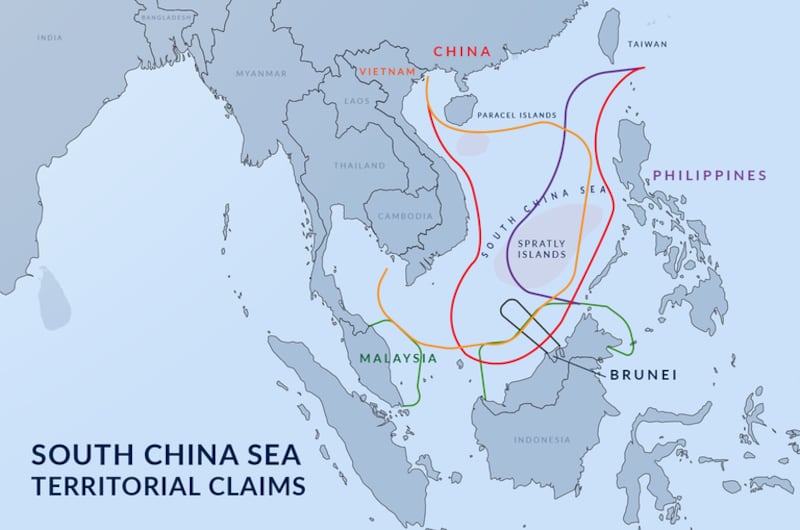Updated at 10 a.m. ET on 2022-01-14
The U.S. State Department has issued its most comprehensive study yet on China’s sweeping maritime claims in the South China Sea and concludes they amount to an unlawful claim to most of the disputed waterway and “gravely undermine the rule of law.”
The 47-page 'Limits in the Seas' report, released on Wednesday, states that China's claim to "historic rights" over the South China Sea is unlawful – a finding that concurs with the decision of the 2016 international arbitration tribunal in a case brought by the Philippines.
China, which has ignored the tribunal, has been engaged in territorial disputes with five other claimants in the South China Sea. The Chinese claims are by far the largest, covering up to 90 percent of the sea.
“These claims, especially considering their expansive geographic and substantive scope, gravely undermine the rule of law in the oceans and numerous universally recognized provisions of international law reflected in the Convention (on the Law of the Sea or UNCLOS),” the State Department report says.
The U.S. reiterated its call for the People’s Republic of China (PRC) to conform its maritime claims to international law and to comply with the decision of the tribunal, as well as “to cease its unlawful and coercive activities in the South China Sea.”
In the past Beijing has insisted that it holds “historical rights” to most of the South China Sea and declared the arbitration tribunal’s ruling “null and void.” It also pointed out that the U.S. is not a signatory of UNCLOS, which China ratified in 1996.
“China sets great store by the Convention and earnestly observes the Convention in a rigid and responsible manner. The U.S. refuses to join the Convention, but styles itself as a judge,” said Wang Wenbin, spokesman for China's Ministry of Foreign Affairs.
“Such political manipulation is irresponsible and undermines international rule of law,” he told a news conference in Beijing on Thursday.
“Our sovereignty and relevant rights and interests in the South China Sea are established in the long course of history and are in line with the UN Charter, UNCLOS and other international law,” Wang added.
The U.S. report, which examines four categories of maritime claims made by China, is one of a series issued by the State Department’s Office of Ocean and Polar Affairs, Bureau of Oceans and International Environmental and Scientific Affairs on maritime claims by different countries.
“It’s really well-argued, based on the latest information from Chinese sources,” said Bill Hayton, a South China Sea scholar.
“It doesn’t change the U.S. position in any way but it gives everyone who follows developments in the South China Sea a really good set of data points on which to base their discussions,” he said.
‘Historical rights’
The U.S. position has always been that it does not take sides in the dispute about which country has sovereignty over the islands in the South China Sea.
The new study “examines only the maritime claims asserted by the PRC and does not examine the merits of sovereignty claims to islands in the South China Sea asserted by the PRC or other states.”
However, the findings show that “the overall effect of these maritime claims is that the PRC unlawfully claims sovereignty or some form of exclusive jurisdiction over most of the South China Sea.”
In recent years, China has been developing artificial islands and stepping up military presence to reinforce its sovereignty claims despite concerns and protests from neighboring countries.
The new report builds on a previous U.S. analysis of China’s “nine-dash line” that encircles most of the South China Sea and serves as the basis for the claim to “historical rights” in the sea.
“The idea of ‘historic rights’ in the South China Sea was invented by Professor Kuen-Chen Fu and other nationalist ‘New Party’ politicians in Taiwan in the late 1980s and 1990s,” said Hayton, adding that it was then incorporated into China’s legal framework.
China also claimed that its nine-dash line is a successor to the U-shaped line map issued by the Republic of China government, based in Taiwan, in 1947.
But Taiwan, despite being a claimant, “does not recognize the nine-dash line used by China to claim ‘historical rights’ in the South China Sea,” said Chung-Ting Huang, a research fellow at the Taiwanese Institute for National Defense and Security Research.
“Taiwan and China are not on the same page about the definition of the nine-dash line,” Huang said.
Noting that China has not provided any additional information about the substantive content of this historical rights claim, the “Limits in the Seas” report said the claim is inconsistent with international law and “the international community, including littoral states of the South China Sea, has made clear that it rejects the PRC’s ‘historic rights’ claim.”

Other maritime claims
Besides “historic rights,” three other categories of claims examined in the State Department’s report are sovereignty claims over maritime features; straight baselines; and maritime zones.
Baselines are demarcation lines connecting the outermost points of the features of archipelago that are meant to circumscribe the territory that belongs to it.
China claims sovereignty over more than 100 features in the South China Sea that are submerged by water during high tide.
Beijing has been drawing straight baselines around four groups of scattered islands in order to claim ownership of everything within those baselines.
Analyzing each of those claims using UNCLOS, the report said that China’s “expansive maritime claims are plainly inconsistent with international law.”
“The United States and numerous other states have rejected these claims in favor of the rules-based international maritime order within the South China Sea and worldwide,” it said.
This report has been updated to add comments from the Chinese foreign ministry.
